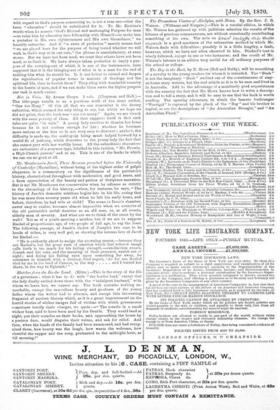Mr. Moorhouse's Jacob, Three Sermons preached before the University of
Cambridge (Macmillan), without being of the highest order of pulpit eloquence, is a commentary on the significance of the patriarch's history, characterized throughout with moderation and good sense, and a keen appreciation of the beauty and pathos of Scripture narrative. But is not Mr. Moorhens° too conservative when he adheres so strictly to the chronology of the history,—when, for instance, he says, "The history of Jacob's domestic relations begins late in his life, seeing that he was more than seventy years old when he left his early home, and before, therefore, he had wife or child? The scene in Isaac's chamber, never easy to realize, becomes almost impossible when we conceive ef the old patriarch's artful deceiver as an old man, or, at all events, elderly man of seventy. And what are we to think of the scene by the well? Not as of a youth meeting a maiden, but if we are to suppose Rachel of proportionate age, of two people of full age, to say the least. The following passage, of Jacob's choice of Joseph's two sons to be heads of tribes, is very well put, as showing the intense love of Jacob for Rachel :— " He is evidently about to assign the crowning reason,—because they are Rachel's, but the great rush of emotion which that beloved image calls forth is too much for his failing strength,—recollection ceases, Joseph and his sons, and the meaning of their presence, vanish out of sight ; and fixing his failing eyes upon something far away, he murmurs to himself, with a dreamy, fond regret, As for me, Rachel died by me in the land of Canaan, in the way and I buried her there, in the way to Ephrath.' "






























 Previous page
Previous page